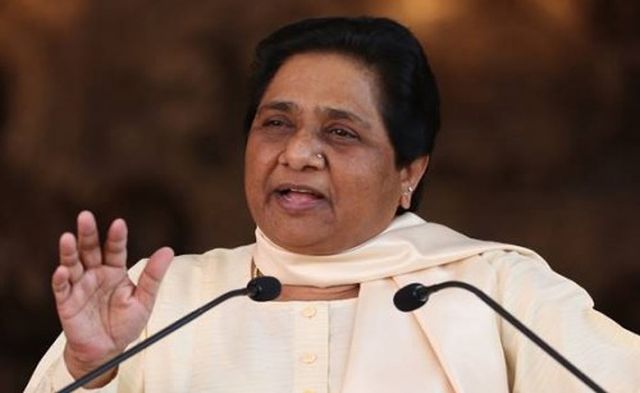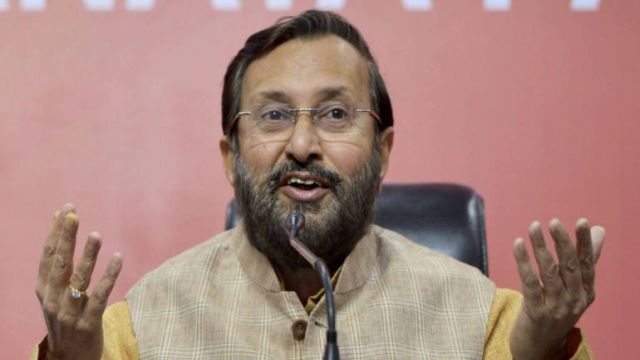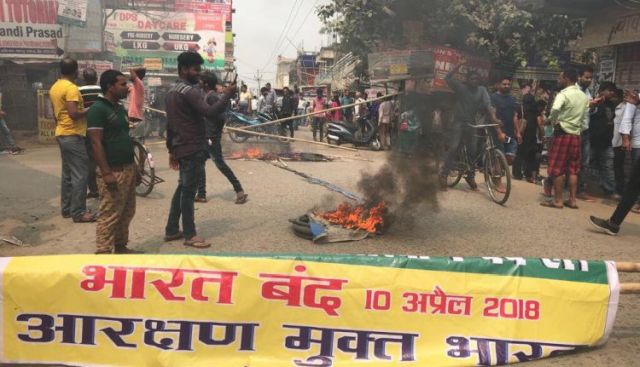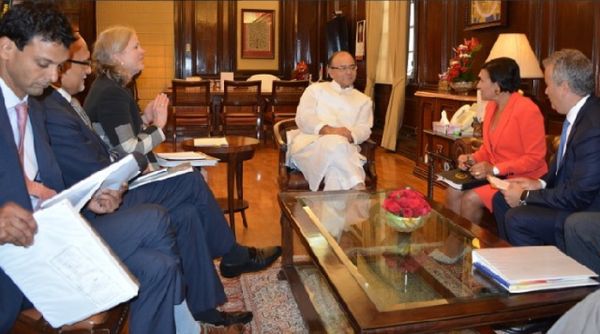
by admin | May 25, 2021 | News, Politics
 New Delhi : The Supreme Court was told on Thursday that reservation in promotion is impermissible and unconstitutional, and it is the responsibility of the state to strike a balance while giving reservation in promotion to Scheduled Castes and Scheduled Tribes.
New Delhi : The Supreme Court was told on Thursday that reservation in promotion is impermissible and unconstitutional, and it is the responsibility of the state to strike a balance while giving reservation in promotion to Scheduled Castes and Scheduled Tribes.
Those opposing the reservation in promotion told the five-judge constitution bench headed by the Chief Justice Dipak Misra that there cannot be reservation without balance.
“The state is reposed with the responsibility to strike a balance and not just enforce reservation,” pleaded senior counsel Shanti Bhushan and Rajeev Dhavan on behalf of the respondents opposing the Centre’s plea for reconsideration of 2006 judgment by which top court had laid down the criteria for reservation in promotion for SC/ST.
Spelling out the foundational features of the 2006 Nagaraj judgment, Dhavan said that the creamy layer was a principle of equality and equality has to be substantive and not just formal.
He told the bench that Nagaraj judgment, for ensuring that equality as basic structure is not violated, had laid the pre-condition of compelling reasons — backwardness, inadequacy of representation — and overall administrative efficiency which the government has to satisfy before embarking for reservation in promotion.
Defending the Nagaraj judgment, Dhavan said it can be revisited only if there is foundational defect in it.
“There was no fatal flaw in Nagaraj judgment,” Dhavan told the constitution bench.
Earlier, arguing for another respondent, senior counsel Shanti Bhushan said that reservation is for a class of people who are backward and not for an individual in a cadre in government job.
Finding no infirmity with the reservation at the entry stage, Bhushan said that once a person is collector, Income Tax officer or holding any such or equivalent position then any reservation in promotion would be for an individual, as at that level no one is backward.
Reservation in government jobs at entry point would be for the “class of backward people”, but subsequent intra-cadre reservation would be for an individual, as having occupied a position in government service he cannot be described as backward.
Earlier, seeking reconsideration of the top court decision in Nagaraj judgement, senior counsel Indira Jaising said that the validity of the constitutional provisions could not be tested on the grounds of “compelling reasons — backwardness, inadequacy of representation and overall administrative efficiency”.
Contending that there could not be any “quantitative exclusion” of SC/ST, Jaising said that it was only the “100-point roster system that would ensure that nobody (in reserved category) would exceed the ceiling limit of quota”.
Jaising appeared for an apex body of SC/ST employees serving in the government.
By its 2006 judgment, the top court had upheld the validity of Constitution’s 85th Amendment by which Article 16 (4A) — providing for reservation in promotion with consequential seniority” was inserted in the Constitution.
The reservation in promotion was to come into effect retrospectively from June 17, 1995.
The judgment that was pronounced on October 19, 2006, had said: “… State will have to show in each case the existence of compelling reasons, namely backwardness, inadequacy of representation and overall administrative efficiency, before making provision for reservation in promotion.”
Senior counsel Dhavan will resume his arguments on August 29 – the next date of hearing.
—IANS

by admin | May 25, 2021 | Employment, Government Jobs, News, Politics
 Lucknow : Bahujan Samaj Party (BSP) supremo Mayawati on Tuesday batted for reservation in government jobs for the economically weaker upper castes and Muslims and other minorities.
Lucknow : Bahujan Samaj Party (BSP) supremo Mayawati on Tuesday batted for reservation in government jobs for the economically weaker upper castes and Muslims and other minorities.
She said if the Modi government brought a Bill to give 18 per cent or more reservation to the poor from the upper castes, Muslims and other minority groups, her party will be the first to support it.
Welcoming the passage of The Scheduled Castes and Scheduled Tribes (Prevention of Atrocities) Amendment Bill, 2018 in the Lok Sabha, the four-time Uttar Pradesh Chief Minister also expressed hope that the Bill will sail through the Rajya Sabha comfortably.
She, however, credited the pressure built by her party and the sacrificeS of the Dalits who participated in the April 2 ‘Bharat Bandh’ for the development.
“The voice of the Dalits and the marginalised along with the BSP cadres forced the government at the Centre to bring in this Bill,” Mayawati said.
She pointed out how an NDA Minister (Ram Vilas Paswan) was forced to announce a sit-in to compel the government to act against the dilution of the SC/ST Act by the Supreme Court.
She, however, slammed other leaders of parties in the National Democratic Alliance government for keeping mum on the issue that was close to the heart of millions of Dalits.
—IANS

by admin | May 25, 2021 | Corporate, Corporate Governance, Employment, Government Jobs, News, Politics

Prakash Javadekar
New Delhi : Union HRD Minister Prakash Javadekar on Thursday said the Modi government was committed to reservation in the faculty positions of universities and that it does not agree with a court order quashing the 50 per cent reservation.
“The University Grants Commission (UGC) was forced to issue a 13-point roster after an Allahabad High Court ruling last year. But we do not agree with the court order,” Javadekar said.
“We have filed two SLPs (special leave petitions). The hearing is scheduled on August 13,” Javadekar told the Rajya Sabha after some members raised the issue during Zero Hour.
He said that the Human Resources Development (HRD) Ministry had already put on hold all interviews for recruitment for teaching positions in universities and colleges which were to be held under the roster pending a decision on the SLPs.
“We are hopeful we will be able to save reservation for Scheduled Castes, Sscheduled Tribes and OBCs. We will neither let it go, nor let others abolish it,” he said.
The issue was raised by Samajwadi Party leader Ram Gopal Yadav. He termed the March 5 UGC roster that kept nine out of every 13 teaching positions as unreserved, giving three to OBCs and one to Scheduled Castes, as a “conspiracy” to deprive the SC, ST and the Other Backward Classes (OBCs) of their due as guaranteed by the Constitution.
Yadav was seconded by senior Congress leaders Ghulam Nabi Azad and P.L Punia besides a number of other members siding with the cause.
The Allahabad high Court had in April last year struck down a UGC circular prescribing institution-wise reservation to fill vacant faculty positions. The Supreme Court too upheld the High Court’s order, prompting the UGC to issue a circular for reserving seats for SC, ST and OBCs department-wise.
—IANS

by admin | May 25, 2021 | News, Politics
 Patna : Over a dozen of people were injured on Tuesday in a violent clash in Bihar during the “Bharat Bandh” called by various groups to protest against reservation policies, police said.
Patna : Over a dozen of people were injured on Tuesday in a violent clash in Bihar during the “Bharat Bandh” called by various groups to protest against reservation policies, police said.
Supporters, mostly upper castes youths, blocked roads and forcibly enforced the nationwide shutdown in Ara town, Bhojpur district.
“More than a dozen people were injured in the violent clash between supporters of the Bharat Bandh and a pro-reservation group comprising OBCs and Dalits,” a district police official said.
Additional security have been deployed in Ara.
According to reports reaching here, hundreds of youths opposing reservation to SC/ST and OBCs and supporting Bharat Bandh, have blocked roads at several places, halted trains and forcibly closed markets in Patna, Begusarai, Lakhisarai, Muzafffarpur, Bhojpur, Sheikhpura and Darbhanga districts.
The clash comes a day after the Union Home Ministry issued an advisory to all states to take precautionary measures in view of calls on social media for the “Bharat Bandh” by various anti-reservation groups to protest clashes during the April 2 SC/ST shutdown.
The Bharat Bandh on April 2 by Dalit groups against the alleged dilution of the Scheduled Castes and Scheduled Tribes (Prevention of Atrocities) Act by a Supreme Court order had led to violence and arson in many parts of the country which claimed several lives and left hundreds of civilians and policemen injured.
—IANS

by admin | May 25, 2021 | Employment, Government Jobs, News, Politics
 New Delhi : The creamy layer ceiling for Other Backward Classes candidates for securing government jobs was on Wednesday raised to Rs 8 lakh as the union cabinet cleared a proposal for a commission to work out sub-categorisation within OBCs for a “more equitable distribution of reservation benefits”.
New Delhi : The creamy layer ceiling for Other Backward Classes candidates for securing government jobs was on Wednesday raised to Rs 8 lakh as the union cabinet cleared a proposal for a commission to work out sub-categorisation within OBCs for a “more equitable distribution of reservation benefits”.
Union Finance Minister Arun Jaitley said after a cabinet meeting here that OBC families earning up to Rs 8 lakh per annum will not be considered in the creamy layer. Earlier, this ceiling was Rs 6 lakh per annum.
“The cabinet was apprised that the creamy layer criterion limit has been raised to Rs 8 lakh annually for the central government,” he said.
Asked if the raised limit will also be applicable to public sector undertakings, Jaitley said the issue was under “active consideration of the government”.
Jaitley said the cabinet approved a proposal for setting up of a commission under article 340 of the Constitution to examine the issue of sub-categorisation of the OBCs.
He said the commission will examine the extent of inequitable distribution of benefits of reservation among the castes or communities included in the broad category of OBCs, with reference to the OBCs included in the Central list.
It will work out the mechanism and parameters for sub-categorisation within such OBCs, identify the respective castes or communities or sub-castes in the central list of OBCs and classify them into their respective sub-categories.
“With this, those in the broad category of OBCs who were till now devoid of benefits of reservation, will get the benefits. There will be more equitable distribution,” he said.
The commission will submit its report within 12 weeks from the date of appointment of the Chairperson.
Jaitley said the National Commission for Backward Classes had given its recommendation in 2011 that there should be sub-categorisaion and the Parliamentary Standing Committee had also given such a recommendation.
The Supreme Court, in its November 1992 order, had observed that there is no Constitutional or legal bar to a state categorising backward classes as backward or more backward.
The Minister said 11 states have already implemented the sub-categorisation for state level services. These are Andhra Pradesh, Telangana, Bihar, Jharkhand, Puducherry, Haryana, Karnataka, West Bengal, Maharashtra, Tamil Nadu and Jammu and Kashmir (for Jammu region).
On whether the government is going to review the reservation mechanism, Jaitley said: “There is no such proposal… there will be no review.”
On caste census, Social Justice and Empowerment Minister Thawarchand Gehlot, who was also present at the press meet, said the information about the census is with the Home Ministry.
He said the central OBC list has over 5,000 castes and communities.
—IANS

 New Delhi : The Supreme Court was told on Thursday that reservation in promotion is impermissible and unconstitutional, and it is the responsibility of the state to strike a balance while giving reservation in promotion to Scheduled Castes and Scheduled Tribes.
New Delhi : The Supreme Court was told on Thursday that reservation in promotion is impermissible and unconstitutional, and it is the responsibility of the state to strike a balance while giving reservation in promotion to Scheduled Castes and Scheduled Tribes.



